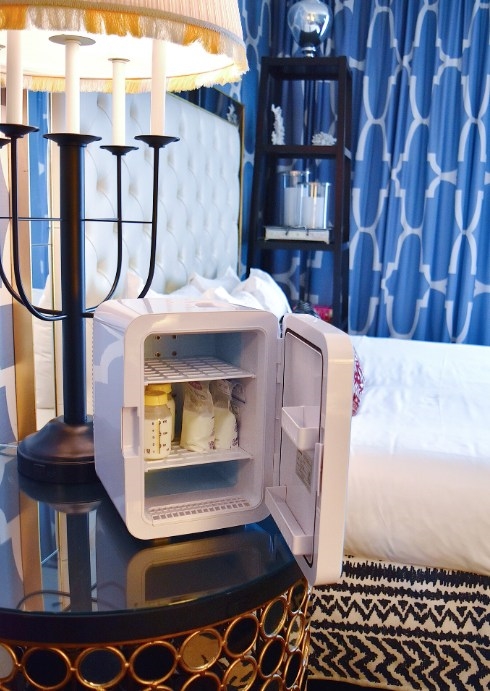These portable mini fridges were designed to store breast milk while traveling
For mothers of young babies, traveling while producing milk comes with challenges, including navigating hotel stays. Typically, parents resort to asking the front desk about storing bags of milk in hotel fridges or freezers; others have reported using coolers or ice buckets, or paying for services that rent out fridges.
Kimpton Hotels, a chain of boutique properties around the world, is offering one solution: on-demand fridges specifically for storing breast milk. As of September 12, the compact fridges will be available to guests at all Kimpton properties.

When mothers travel and need to pump their breast milk, they often have to find alternative ways to store it. It’s not as simple as slotting bags next to the little vodka bottles in the minibar, because those fridges are often kept at temperatures as high as 59 degrees Fahrenheit, making them more like coolers that aren’t even safe for storing food.
Hotel insiders warn that some minibars even “snooze” at night, turning off to save energy. And at room temperature, breast milk only lasts for up to four hours, according to the Centers for Disease Control and Prevention.
Kimpton aims to “support families traveling with breast milk, and provide some ease and and peace of mind while on the go,” says the company’s chief commercial officer, Kathleen Reidenbach. The “Mini Me Milk Fridges” will be set at 40 degrees, which is the CDC-advised temperature for human milk, ensuring it stays fresh for up to four days.
“Parents can feel confident and comfortable that the milk is being stored at the perfect temperature,” Reidenbach says.
Demand for room fridges has always existed, but, according to Reidenbach, it has risen due to the uptick in leisure travel after the height of COVID-19 restrictions. Business travel has returned as well, although it’s still far from matching its pre-pandemic levels. The upcoming holiday season may bring additional travel spikes.
From the September launch onward, Kimpton will make fridges available across all 77 of its U.S. and global properties, from Barcelona to Bangkok. The idea is to have enough stock for all guests who might request them, but the fridges will be available on a first-come, first-served basis. Guests can request a fridge when they reserve their accommodations or have one brought up to their room when they arrive.
The compact, portable fridges are 14 inches tall and have 10-liter capacities; they can be set on the counter or nightstand. Kimpton employees will also have a fridge on-site available for their use.
Accommodation is not the only element of travel that’s awkward for breastfeeding moms. In May, a mother’s Twitter thread went viral when she was barred from taking two ice packs for milk storage through security at Los Angeles International Airport. That’s despite the fact that the TSA itself has officially designated the substance as exempt from its 3.4-ounce limit, which the woman noted in her post.
In response, three members of Congress coauthored a bipartisan bill, the Bottles and Breastfeeding Equipment Screening (BABES) Enhancement Act, to ensure that the TSA clarifies and updates its guidance on breast milk in consultation with leading maternal health groups.
The issue has become even more important this year, as the U.S. has experienced a shortage of baby formula due to the supply chain crisis, leading some women to start breastfeeding instead.
“I wish I had had this [option],” Reidenbach says about the fridges. “I never even attempted [to store breast milk] while I was on the road. I just gave up.”
(28)


